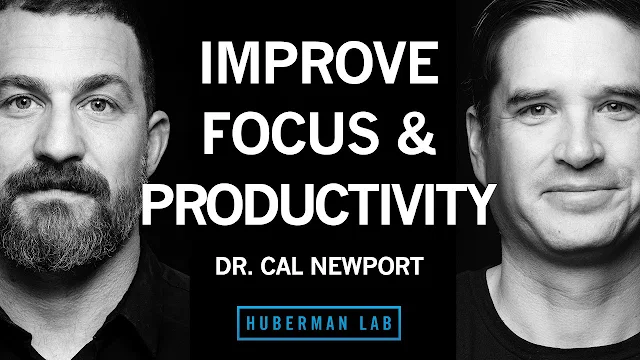Guest: Dr. Cal Newport, professor of Computer Science at Georgetown University and author of books like Deep Work and Slow Productivity.
Host: Dr. Andrew Huberman, professor of Neurobiology and Ophthalmology at Stanford School of Medicine.
Episode Theme: The discussion revolves around tools for enhancing focus and productivity, leveraging Newport’s research and protocols on deep work, cognitive focus, and productivity without burnout.
Key Takeaways:
Focus on Deep Work: Cal Newport emphasizes the importance of deep, undistracted work to improve productivity and creativity.
Slow Productivity: Newport advocates for avoiding burnout by focusing on high-quality work over time, rather than constantly trying to accomplish more.
Techniques for Focus: He discusses specific techniques for minimizing distractions from smartphones and social media, while offering alternative strategies for those who need to stay connected.
Cognitive Science of Distraction: The conversation touches on studies around task switching and its negative effects on productivity.
Practical Tools: Newport suggests practical rituals, such as keeping your phone out of sight, to enhance focus and maintain a productive mental state.
Podcast Notes:
1. Introduction and Background:
- Huberman introduces the topic of focus and productivity, highlighting how Newport’s work in Deep Work influenced his own approach to scientific and podcasting efforts.
- Newport has a strong academic background, having trained at MIT, and his latest book, Slow Productivity, offers protocols for maintaining productivity without succumbing to burnout.
2. Newport's Phone Habits:
- Newport confirms that while he owns a smartphone, he refrains from social media use, which significantly reduces its power to distract him.
- He explains how, by limiting engagement with these engineered distractions, the phone reverts to being a simple, helpful tool rather than a source of constant interruption.
- Rituals:
- Newport keeps his phone physically away when working and doesn’t allow it in certain rooms, like his library, which is dedicated to focused work.
- He discusses the importance of creating a mental and physical space for deep work, uninterrupted by technological distractions.
3. Deep Work Environment:
- Newport describes his writing environment: a specialized library space with no permanent technology, only books and a curated setup that fosters inspiration.
- He highlights how rituals, such as sitting by a fireplace or walking, help him maintain deep thought and creativity.
- Custom Desk: Newport designed a desk specifically for this purpose, showing how intentional the space is in supporting his focus.
4. Cognitive Processes and Distraction:
- Both Newport and Huberman delve into the neuroscience behind attention, discussing how the brain is more efficient when not multitasking.
- Newport explains that task switching (e.g., checking emails or texts) creates cognitive costs, which accumulate over time, making deep, uninterrupted work harder to achieve.
- Whiteboard Method: Newport talks about using whiteboards in academic settings to help enhance focus and group productivity, referring to it as a “hack” that elevates concentration by engaging multiple minds simultaneously.
5. Slow Productivity and Avoiding Burnout:
- Newport’s concept of Slow Productivity emphasizes doing fewer things better.
- It’s about creating meaningful work that doesn’t demand constant hustle or sacrifice personal well-being.
- Huberman agrees with this approach and mentions how Newport’s methods have inspired him to reflect on his own work habits and eliminate unnecessary distractions.
6. Flow vs. Deliberate Practice:
- The podcast explores the difference between flow (the effortless, immersive state often associated with peak performance) and deliberate practice (the focused, often uncomfortable state required for skill development).
- Newport argues that while flow is enjoyable, true mastery comes from deliberate, challenging practice, which can be mentally taxing but leads to deeper learning and productivity.
7. Impacts of Technology on Attention:
- The conversation shifts to the modern-day challenge of balancing technology use and focus. Newport emphasizes that tools like social media are designed to pull attention, making it difficult to maintain focus without deliberate habits and boundaries.
- Task Switching:
- Huberman expands on the neuroscience, comparing it to a car’s transmission system, where constantly switching gears (tasks) consumes more energy than staying in one focused task for a sustained period.
courtesy: @hubermanlab


